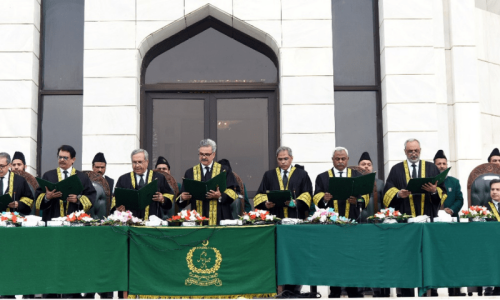Iran's atomic chief warned on Tuesday that the Islamic Republic needs only five days to ramp up its uranium enrichment to 20 per cent, a level at which the material could be used for a nuclear weapon.
The comments made by the Head of the Atomic Energy Organisation of Iran, Ali Akbar Salehi, to Iranian state television come as US President Donald Trump has repeatedly threatened to renegotiate or walk away from the 2015 nuclear deal.
Salehi's warning, along with recent comments by Iranian President Hassan Rouhani, shows that Iran is willing to push back against Trump while still acknowledging they want to keep the deal, which lifted crippling economic sanctions on the country.
“If there is a plan for a reaction and a challenge, we will definitely surprise them,” said Salehi, who also serves as one of Rouhani's vice presidents.
“If we make the determination, we are able to resume 20 per cent-enrichment in at most five days,” he added.
“Definitely, we are not interested in such a thing happening. We have not achieved the deal easily to let it go easily. We are committed to the deal and we are loyal to it.”
Iran gave up the majority of its stockpile of 20 per cent enriched uranium as part of the nuclear deal it struck with world powers, including Trump's predecessor, President Barack Obama. The accord, which lifted sanctions on Iran, currently caps the Islamic Republic uranium enrichment at five per cent.
While Iran has long maintained that its nuclear programme is for peaceful purposes, uranium enriched to 20 per cent and above can be used in nuclear bombs. Iran processed its stockpile of near 20 per cent uranium into a lower enrichment, turned some into fuel plates to power a research reactor and shipped the rest to Russia as part of the deal.
The Obama administration and most independent experts said at the time of the deal that Iran would need at least a year after abandoning the deal to have enough nuclear material to build a bomb. Before the deal was struck, they said the time frame for Iran to “break out” toward a bomb was a couple of months.
While the economic benefits of the deal have yet to reach the average Iranian, airlines in the country have signed deals for billions of dollars of aircraft from Airbus and Boeing. Car manufacturers and others have swept into the Iranian market as well as the country has boosted its oil sales. Abandoning the deal would put those economic gains in jeopardy.
Rouhani, a moderate cleric within Iran's theocratically overseen government, warned last week that it could ramp up its nuclear programme and quickly achieve a more advanced level if the US continues “threats and sanctions” against his country.
Rouhani's comments were sparked by Trump signing a sanctions bill imposing mandatory penalties on people involved in Iran's ballistic missile programme and anyone who does business with them. The US legislation also applies terrorism sanctions to Iran's Revolutionary Guard and enforces an existing arms embargo.













































